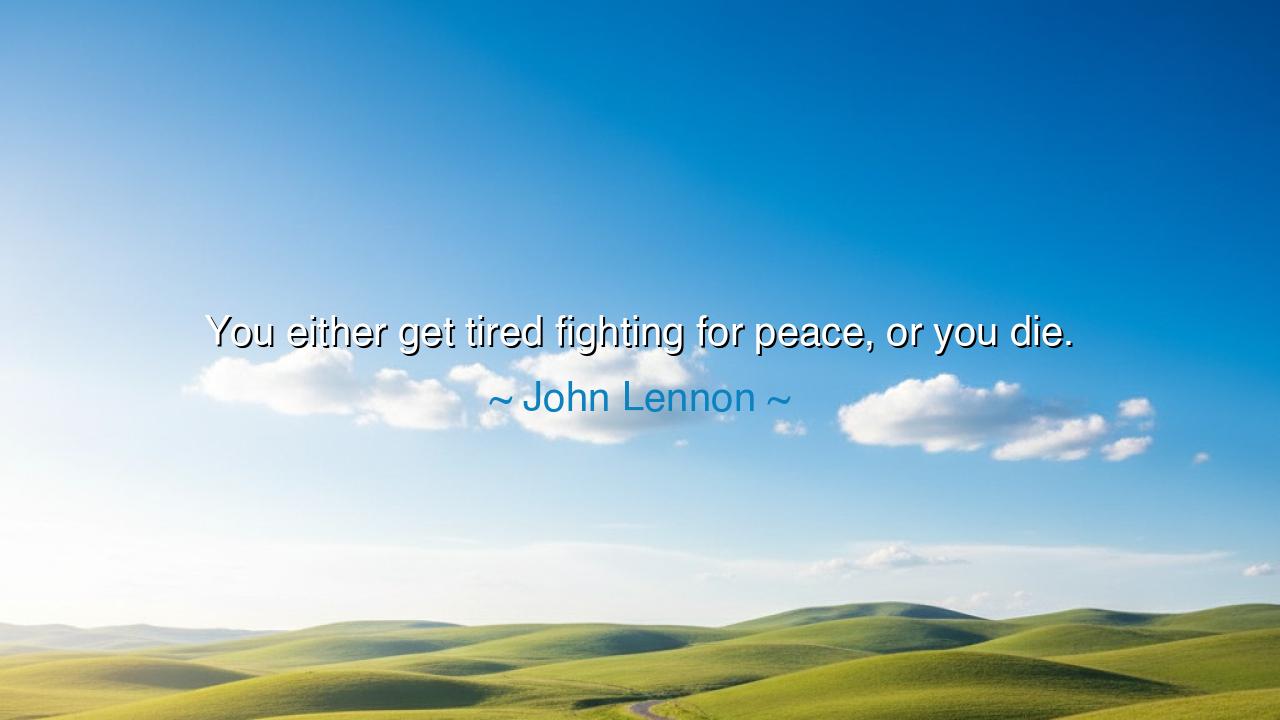
You either get tired fighting for peace, or you die.






The words of John Lennon—“You either get tired fighting for peace, or you die”—strike like a lament and a rallying cry woven into one. In them, Lennon reveals both the weariness and the necessity of struggle. Peace, though desired by all, is never easily won; it must be pursued through opposition, misunderstanding, and often violence from those who despise it. To fight for peace is to enter a battle that does not end, a battle where fatigue is constant and sacrifice inevitable. Yet to abandon this fight is to surrender not only to war, but to despair. Thus, he declares that the choice is stark: either endure the exhaustion of striving for peace, or succumb to the death that comes when violence reigns unchecked.
The origin of this saying emerges from Lennon’s life as both a musician and activist. Rising from the heights of fame as a Beatle, he turned his voice to causes greater than entertainment. In the 1960s and 70s, amid the Vietnam War and global unrest, he and Yoko Ono staged their famous “Bed-Ins for Peace,” wielding art and protest against the machinery of war. Lennon had seen the cost of conflict, and his words reflect the painful truth: that even as one grows weary, the pursuit of peace cannot be abandoned, for to do so is to allow violence to triumph.
History confirms this grim but noble reality. Consider Mahatma Gandhi, who led India’s struggle for freedom through nonviolence. His body bore the scars of imprisonment, hunger, and relentless struggle. He grew weary, yet never ceased to fight for peace. In the end, he was struck down by an assassin’s bullet, proving Lennon’s words true: the battle for peace either drains a man’s strength or claims his life. Yet Gandhi’s death was not defeat, for his unyielding struggle lit a torch that still guides nations.
Or think of Martin Luther King Jr., who marched and preached for civil rights with the weapon of love and nonviolence. The struggle was exhausting, the opposition fierce, yet he pressed forward, declaring that hate cannot drive out hate. He too was slain, embodying the second part of Lennon’s truth: that often those who fight for peace die in their pursuit. But like Gandhi, his death was not the end; his life became a seed from which justice continues to grow.
The meaning of Lennon’s words is not despair but reality. He strips away illusion: the path of peace is not soft, not gentle, not easy. It is war of another kind, where the weapons are courage, persistence, and love. It is war against the darker impulses of mankind, against greed, violence, and oppression. The peacemaker will grow weary, will be mocked, will be hated, and sometimes will be slain. Yet this struggle, though exhausting, is the only struggle that redeems humanity.
The lesson for us is clear: if you seek peace, you must be ready to endure. Do not imagine it will come quickly or without cost. Prepare your heart for sacrifice, your body for weariness, your soul for persistence. For the fight is long, and many will fall, but those who endure become the pillars upon which future generations may rest. It is not weakness that sustains peace, but unbreakable strength clothed in compassion.
Practically, let each of us take this to heart. Fight for peace in your home by choosing forgiveness over bitterness. Fight for peace in your community by standing against injustice. Fight for peace in the world by lending your voice to the voiceless, your strength to the weak, and your compassion to the forgotten. You may grow tired, yes—but your fatigue is the mark of honor, proof that you have not surrendered.
Thus, John Lennon’s words echo across the ages: “You either get tired fighting for peace, or you die.” It is the anthem of every martyr, every reformer, every soul who refused to bow to the empire of violence. Remember this, and pass it to your children: though the struggle is long and wearying, it is the only struggle worth our lives, for from it springs the only treasure that endures—true and lasting peace.






AAdministratorAdministrator
Welcome, honored guests. Please leave a comment, we will respond soon